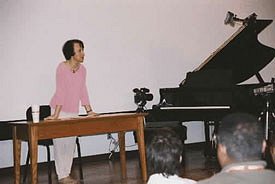Yamaha Instruments Used to Help Rehabilitate Injured Pianists
 Edna Golandsky says, "Everyone was absolutely delighted with the quality of the pianos" provided by Yamaha. |
"Dorothy Taubman understood the invisible aspect of playing the piano – the fact that there is a whole world of motion that you cannot see," she explains. "I've continued and built on her work. I've been teaching for years and years, and the pedagogy has gotten better and sharper. We've worked more and more along the lines of movements that make the playing right, bettering the tools of musical expression and freedom in the act of playing."
Yamaha has been an important partner in her work. "Yamaha has been great to us," she beams. "They helped us obtain 15 pianos for our recent summer institute at Princeton University, where we held classes and clinics in technique and pedagogy, and offered master classes. We also gave evening concerts – classical, contemporary and jazz. I'm extremely grateful. Our relationship has always been wonderful, and it continues to be so with Stan Zielinski, the new Director of Yamaha Artist Services."
"Princeton had their own piano in the concert hall," explains Golandsky. "But we needed an instrument in the auditorium at the museum – a lecture hall with a stage which seats about 150. It was wonderful to have a Yamaha grand piano there. It was used all day. And we needed 14 practice pianos for student use. A lot of these students are professional pianists, teachers and students. Everyone was absolutely delighted with the quality of the pianos."
To learn more, write Yamaha Corporation of America, P.O. Box 6600, Buena Park, CA 90622-6600; telephone (714) 522-9011; or e-mail infostation@yamaha.com.
 |
| © 2010 Yamaha Corporation of America. All rights reserved. |
